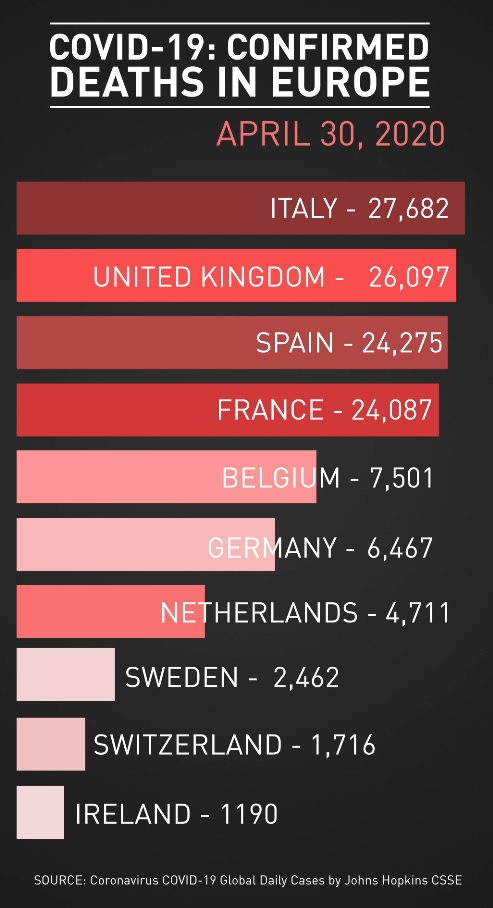HEADLINES
– COVID-19's reproduction rate in Germany is currently averaging 0.76 , according to the RKI public health authority. As the rate reflects the number each person will subsequently infect, a number below 1 means new cases should continue to drop.
– The eurozone economy shrank by 3.8 percent in the first quarter, underperforming expectations for a 3.5 percent drop, even before the biggest impact of the COVID-19 lockdowns was felt.
– Spain's economy shrank by a record 5.2 percent in the first quarter , the worst since the historical series began in 1970. France's economy contracted by 5.8 percent, the sharpest since World War II.
– Ukraine's health minister has asked the public for patience after anti-lockdown protests. "Quarantine was introduced very quickly and it was thanks to this that we managed to contain the situation," said Maksym Stepanov. Ukraine has had 261 COVID-19 deaths from a population of 42 million.
– The CEO of British pharmaceutical company AstraZeneca said it will know by June or July whether a coronavirus vaccine it is working on with the University of Oxford will be effective.
– Slovenia starts to ease restrictions by allowing citizens to travel outside their local municipalities.
– Social distancing measures will "certainly" be extended until 10 May, according to German chancellor Angela Merkel's chief of staff. The death toll in Germany rose by 173 in the past 24 hours, to 6,288.
– The UK justice minister has warned businesses to stick to lockdown rules. "It would be a mistake for different businesses or individuals to just go off at a tangent and do their own thing," said Robert Buckland.
–Swedish climate activist Greta Thunberg has donated $200,000 to UNICEF's new campaign to help protect children from the pandemic with the purchase of soap, masks and gloves.
– The UK car industry's output fell by a third in March to its lowest level since 2009. An industry body estimates it faces losing more than $10 billion due to COVID-19.
– Schools in Hungary will remain closed until the end of May and events with more than 500 participants cannot be held until 15 August.
– Improved air quality in Europe due to lockdowns has delivered health benefits equivalent to avoiding 11,300 premature deaths, according to a study published on Thursday by the Helsinki-based Centre for Research on Energy and Clean Air.
– Ireland's chief medical officer doubts restrictions will ease before next Tuesday's scheduled expiry date. "If we were to ease restrictions at this moment in time, we could potentially run into difficulties sooner," said Tony Holohan.
– European Commissioner Paolo Gentiloni has urged EU leaders to expedite their recovery plan of grants and loans to hard-hit countries. "This recovery strategy should start in the second half of 2020, and not in December," said Gentiloni.

A new drive-in cinema at an airport in Vilnius, Lithuania, stands in as regular theaters are closed due to the coronavirus outbreak. /Mindaugas Kulbis/AP Photo
ACROSS EUROPE:
Ross Cullen in Paris
French GDP shrank 5.8 percent in the first quarter of 2020, according to France's official INSEE statistics agency, the sharpest squeeze since World War II. After contracting by 0.1 percent in the last quarter of 2019, this confirmation of another drop in gross domestic product now officially means France is in recession, something that had already been accepted by economists.
INSEE said consumer spending dropped 6.1 percent and business investment fell 11.4 percent in the first quarter from the previous three months. The lockdown here is due to begin winding down from 11 May, and the government has brought in a $120 billion package of measures to try to support companies and workers.
Ira Spitzer in Berlin
The number of unemployed people in Germany rose in April by 308,000, bringing the unemployment rate to 5.8 percent. In addition, German companies have applied to enrol10.1 million workers in the country's short-term work program, a furlough scheme designed to prevent lay-offs.
The head of Germany's Robert Koch Institute said 467,000 coronavirus tests were carried out last week and that the number of positive test results was around 5 percent. He also said the virus's reproduction rate was 0.76, meaning that on average an infected person would spread the virus to fewer than one person.
German chancellor Angela Merkel will meet with state leaders on Thursday to discuss the possible loosening of restrictions, including a proposed plan to play professional football matches without spectators.
00:32

Isobel Ewing in Budapest
Hungary's prime minister, Viktor Orban, has announced the country's fight against the virus has entered a new phase, meaning "life can restart, but we must act gradually and according to a strict timetable."
Orban says a high level of protection must be maintained for the elderly and people living in Budapest and its surroundings, because this is the most infected part of the country.
Movement restrictions in the capital will stay in force, but they will be relaxed in the countryside.
This means shops can reopen with regular hours, terraces and gardens of restaurants and cafes can reopen and people can visit parks.
However, practising social distancing and wearing masks will remain compulsory in shops and on public transport.
"Thanks to our joint effort, Hungary is ready to handle even large-scale disease," said the prime minister in a video posted to his Facebook page. "Today, no one has to worry any longer about being left without adequate care."
Orban was referring to the government decree that ordered public hospitals to make 60 percent of their beds free for COVID-19 patients.
Nicole Johnston in London
It's a big day ahead for the UK government's strategy to tackle COVID-19. Thursday is the deadline to meet its own target of increasing testing to 100,000 people per day by the end of April.
On Tuesday it tested 52,000 people. Public Health England has said it is "pretty confident" the target will be met but with some delay in the figures being reported.
Meanwhile, prime minister Boris Johnson is due to chair the cabinet meeting and present the daily press briefing. It will be the first time Johnson has done so since becoming ill with the virus. He's now recovered.
Johnson's government has not detailed any plans on how it will ease restrictions or move out of lockdown in England, although Wales and Scotland have given an outline of their plans. The UK's lockdown is due to be reviewed on 7 May.
The government is also under fire for the huge number of care home deaths. By the middle of April, there were 3,700 deaths in care homes with COVID-19 mentioned on the death certificate. It's now expected that number could be more than 6,000 people.
Care home staff have criticized the government for "neglecting" the sector, failing to provide adequate personal protective equipment and leaving infected elderly patients to die in care homes. On Tuesday, the health secretary, Matt Hancock, said it was unreasonable to expect the government to apologize for its action in care homes.
Toni Waterman in Brussels
**Belgium: **Goodbye snacks, hello face masks. Vending machines across 80 Belgian rail stations are being emptied to make room for fabric masks and hand gel. It's not clear how much the coronavirus-fighting products will cost.
Come Monday, wearing a face mask while using public transport will be mandatory, as part of the government's lockdown-easing measures. Offenders can be fined up to $271.
European Union: Stunningly gloomy economic data is rolling into Brussels from across Europe, piling pressure on the European Commission to craft a recovery package hefty enough to mitigate the economic devastation caused by the coronavirus pandemic.
Growth contracted by the sharpest pace on record in both the euro area and the EU in the first quarter, at -3.8 percent and -3.5 percent respectively. Eurostat data also showed unemployment ticked higher in the month of March, when lockdown measures were first introduced. It sets the stage for a harrowing Q2, which will reflect many more weeks of lockdown measures.
The Commission will unveil its long-term budget proposal next week. It will be linked to a coronavirus recovery fund, which could top $1.5 trillion.
FROM OUR GLOBAL COLLEAGUES:
**CGTN China: **
'Gunboat diplomacy' is over – put lives first, urges China's UK ambassador
CGTN America:
'Quarantine Together' dating app created for the pandemic times
CGTN Africa:
Guinea-Bissau PM and three ministers test positive for COVID-19
MORE FROM CGTN:
**Check out **
The Pandemic Playbook
, CGTN Europe's major investigation into the lessons learned from COVID-19
**Sign up **
here
** to get the COVID-19 Europe bulletin sent directly to your inbox**
Source(s): Reuters
 简体中文
简体中文





